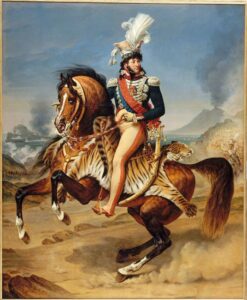
This account is from General Rossetti’s unpublished diary. Murat has just lost his war against the Austrians in the spring of 1815. he had rashly attacked before Napoleon, who had just escaped from Elba, could support him and, by May, had seen his army dissolve and his kingdom placed at the mercy of the advancing Austrians. He had resolved to leave Naples, either going to Gaeta, a coastal fortress which still held out, or to France to seek support from his imperial brother-in-law.
Here is Rossetti’s text:
19 May
At six that morning I was summoned to the palace where everything was as usual; not a piece of furniture was out of place and the king’s valets were still waiting for instructions regarding the packing of the trunks. I was introduced and the king told me that he was planning to head for Gaeta today and that he would die a king in the ruins of that place. He ordered me to return to the palace at ten and that some other individuals had also been ordered to appear. At ten I found the following with the king: the Duke of Rocaromana, Grand Equerry; the Marquis of Giuliano, his aide-de-camp; General of Brigade Bonafoux and Colonel Bonafoux, his nephews. The king told us that, reassured concerning the fate of the queen and his children following the capitulation that had been signed by her and Commodore Canspbelle [sic], he himself just wished to oppose as much as he could and for as long as he could enemy progress. However, he felt obliged to quit the capital and, with his usual good humour, dismissed us saying ‘go, gentlemen, your time is precious but return here at six this evening.’ As I went out I asked the Grand Equerry whether any orders had been given so that the king might be able to take ship. He replied that no, none had been. As I knew the king was careless when it came to the details of such operations I could see that if no one had asked for orders regarding the means of getting away then we would find ourselves without any boats or oarsmen. This reflection made me turn back and I asked the king whether any order had been issued to secure a boat and he said that none had and, moreover, that no such orders were necessary, for one could always find fishing boats, which was all that was needed. I observed that, in circumstances such as these, it was better not to leave things to chance and particularly when the English controlled the port and the harbour. This made it imperative to embark some way from the town. I suggested the fort at Baja where he might embark in absolute security on one of the government launches that pass between Pozzuoli and Baja. He thought this too near to Naples and that he preferred to embark at Miniscola. I impressed upon him the need to send a trustworthy person to wait for us there and to secure a seaworthy vessel for the voyage to Gaeta. I suggested sending Major Malceswki, his ordnance officer (a young Pole of extraordinary bravery who was devoted to the king) on this mission and the king approved my choice and had me warn the officer to readY himself.
That evening, at the appointed time, all those individuals listed above arrived at the palace in civilian attire. At eight the king climbed into the carriage of the Marquis de Giuliano, his aide de camp, and we set off for the caves of Posilippo where fresh horses awaited us and we set off for Pozzuoli at dusk. The officer in charge of the town gate asked us who goes there and I went forward and made myself known to this officer without giving too much away. However, as we passed through the town the king was recognised. The governor sent an officer over to warn us to be careful because some armed peasants had been seen hereabouts sporting red cockades and it was thought they had been sent from Sicily. The officer added that he would send out a patrol of the Civic Guard to clear the way. The king paid no attention to this and we continue don our way and at eleven that evening we were at Miniscola where Major Malceswki waited for us with two boats. We waited half an hour more for Monsieur Decoussy, the king’s secretary, and for my brother, who was also coming with us, and no sooner had they arrived than we embarked from a headland and set sail for Gaeta.
- Poles during the Napoleonic era
- Napoleon's Police
- Nelson at Naples in 1799
- Napoleon and Saint Domingue
- The Death of Murat
- An Account of the Execution of Murat
- Murat escapes from Naples, May 1815
- Antoine Félix Lanfranchi: A Companion of Murat
- Napoleon in Russia
- Ireland in the 1790s
- Napoleon and Egypt
- Prisoners of War (1792 to 1815)
- Travel in Napoleonic Europe